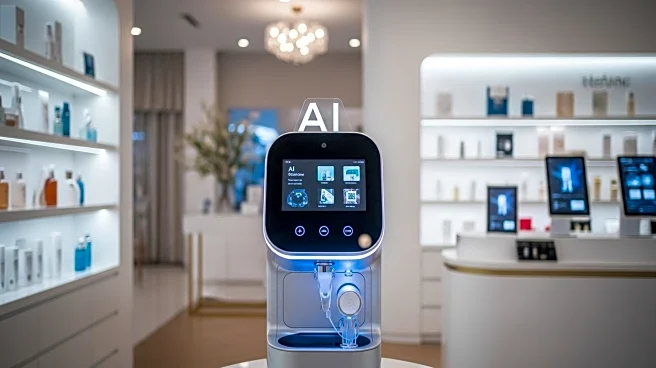What is the story about?
What's Happening?
The beauty industry is witnessing a significant shift towards AI-driven shopping experiences, according to a report by Accenture. The study highlights that 76% of beauty consumers are open to using AI-powered personal shoppers, marking a departure from traditional methods of product discovery and purchase. Generative AI is now the primary channel for beauty product discovery among active users, offering a more conversational and personalized shopping journey. This change is driven by consumers' increasing reliance on AI assistants to ask open-ended questions about beauty products, which are answered using live product data. The report emphasizes the importance of optimizing product content for AI-generated suggestions, as the accuracy and presentation of product information directly influence recommendations.
Why It's Important?
The integration of AI in the beauty industry is reshaping how products are discovered and purchased, offering brands new opportunities to engage with consumers. This shift towards AI-driven personalization can enhance consumer loyalty by providing emotionally engaging experiences. As consumers form strong emotional bonds with AI technology, brands that effectively utilize AI to anticipate consumer needs may gain a competitive edge. The report suggests that beauty companies should prioritize optimizing their product content for AI platforms to ensure favorable representation in AI recommendations. This transformation could lead to more interactive and personalized shopping experiences, driving innovation and differentiation in the beauty market.
What's Next?
Beauty brands are encouraged to implement knowledge management systems to make their content accessible to AI models, ensuring accurate representation in AI-generated suggestions. Regular evaluations of AI outputs are recommended to maintain brand integrity. As AI technology continues to evolve, beauty companies may explore new models for scalable personalization, aligning product offerings with emerging consumer needs. The report highlights Noli, an AI-powered beauty startup, as an example of innovation in operationalizing AI for personalized consumer experiences. This approach could inform decisions around product formulation, packaging, and messaging, potentially leading to more effective and targeted beauty solutions.
Beyond the Headlines
The adoption of AI in the beauty industry raises ethical considerations regarding data privacy and the accuracy of AI-generated recommendations. As consumers increasingly rely on AI for product discovery, brands must ensure transparency in how AI models use consumer data. Additionally, the emotional engagement driven by AI technology may influence consumer behavior, prompting brands to consider the psychological impact of AI interactions. The long-term implications of AI integration in beauty could include shifts in consumer expectations and the development of new standards for personalized shopping experiences.















